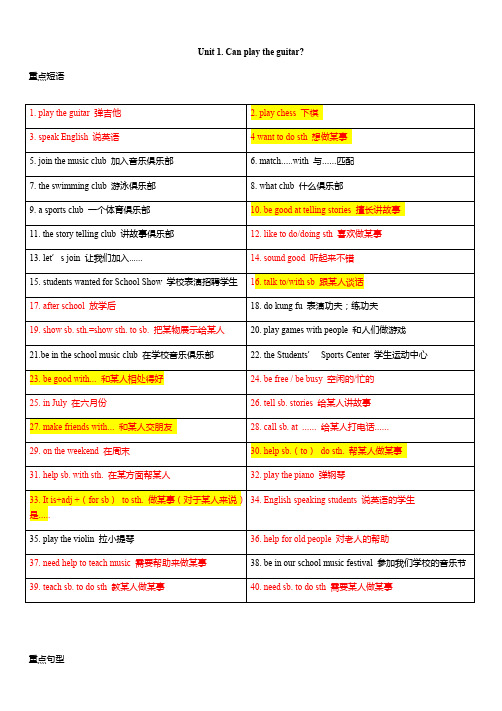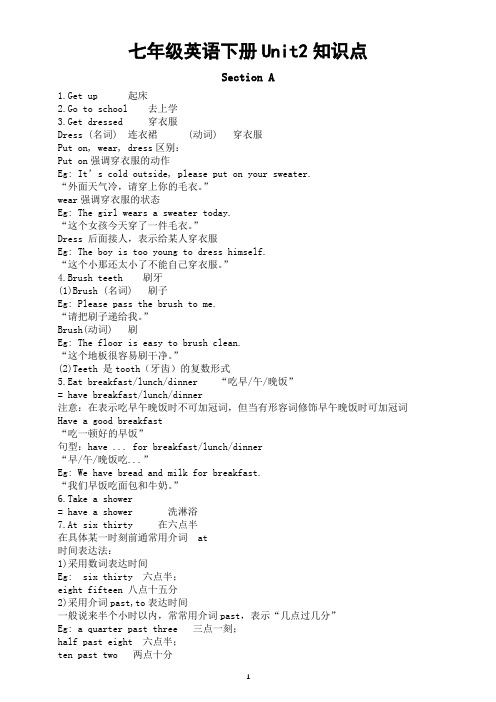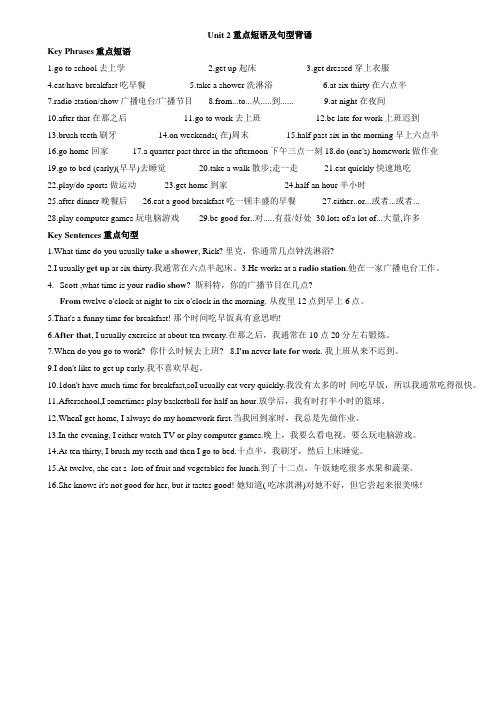七年级单词巧记+句型语法剖析(Unit_2_What_time_do_you_go_to_school)
Unit+2+What+time+do+you+go+to+school+单词讲解英语七年级下册

Unit 2 What time do you go to school ?单词讲解1. up adv. 向上, get up 起床2. dress v. 穿衣服dress-dressed-dressing-dresses(单三) get dressed穿衣服n.连衣裙dress-dresses 复数pl.3. brush v.刷;刷净brush-brushed-brushes(单三) brush sb’s teeth 刷牙n.刷子brush-brushes 复数pl.4. tooth n.牙齿-teeth复数pl.5. shower v. 淋浴;take a shower洗淋浴n.淋浴器6. usually adv.通常地;一般地7. never adv.从不;绝不频率副词always总是100%> usually 通常80% >often 经常60%> sometimes40%>never 频率副词的位置:be后, She is always kind to us.其他v.前,Gina always asks.8. early adv. 早(的)Miss Li has the habit of getting up early and going to bed early.9. job n.工作;职业C eg. Scot has an interesting job.有一份有趣的工作。
10. work v. n.工作U 前无a/anv. eg. As a student we must work hard.作为一名学生,我们必须努力学习。
11. station n.电台;车站radio station广电台;bus station 公交车站railway station火车站12. night n.晚上;夜晚at night在晚上13. funny adj.奇怪的;滑稽可笑的14. exercise 锻炼;练习exercise-exercised-exercising-exercisesv. exercise=do/play sports eg. Swimming is good exercise.游泳是有益的运动。
unit_2_what_time_do_you_usually_go_to_school_Section_A

always, usually, often, seldom, never, sometimes 柱状图
表示频度方面的区别
1. always是频度最大的词,意为“总是;永远”。 I always remember my first day at school. 我将永远记住我上学的第一天。 usually意为“通常”,即很少例外,频度仅次于 always。 What do you usually have for breakfast? 你通常早餐吃什么?
2. often 意为“经常”,在频度上不如 usually那么频繁。 Li Ping often does his homework in the afternoon. 李平经常在下午做作业。 never 从未;永不;决不。 I have never been there. 我从未到过那里。
3. sometimes意为“有时候”,频度比 often小,表示动作偶尔发生,间断较大。 既可以放在be动词、助动词之后,行为动 词之前,也可以放在句首,还可以放在句 尾。 I sometimes go to the library. 我有时去图书馆。 Sometimes I read a book in the evening. 我有时在晚上看书。
Language points
1. What a funny time to eat breakfast! 这是一个感叹句。在英语中,感叹句 由what或how开头,what后接名词, how后接形容词或副词。后面所接部分 为陈述语序。What开头的感叹句中, 主谓部分可以省略。 e.g. What an interesting book (it is)! How well Wang Fei sings!
unit2 what time do you go to school- 七年级英语下册同步必背知

Unit 2 What time do you go to school?七年级英语下册必备知识清单一、词汇知识清单I、课标词汇[注意英译汉]up [ʌp] adv.向上get up起床;站起dress ['dres] v.穿衣服n.连衣裙get dressed穿上衣服brush [brʌʃ] v.刷;刷净n.刷子tooth [tuːθ] n. (pl. teeth[tiːθ])牙齿shower ['ʃaʊə] n.&v.淋浴; n.淋浴器(间)take a shower淋浴;洗澡usually ['juʒuəli] adv.通常地;一般地forty ['fɔː(r)tɪ] num.四十wow [waʊ] interj.(表示惊奇或敬佩)哇;呀never ['nevə] adv.从来;绝不early ['ɜːlɪ] adv.&adj.早(的)fifty ['fɪftɪ] num.五十job [dʒɒb] n.工作;职业work [wɜːk] n.&v.工作station ['steɪʃ(ə)n] n.电(视)台;车站radio station广播电台o'clock adv.(表示整点)……点钟night [naɪt] n.晚上;夜晚funny ['fʌnɪ] adj.奇怪的;滑稽好笑的exercise ['eksəsaɪz] v.&n.锻炼;练习on weekends(在)周末best [best] adj.最好的adv.最好地;最group [gruːp] n.组;群half [hɑːf] n.&pron.一半;半数past [pɑːst] prep.晚于;过(时间)adj.过去的quarter ['kwɔːtə] n.一刻钟;四分之一homework ['həʊmwɜːk] n.家庭作业do (one’s) homework做作业run [rʌn] v.跑;奔clean. [kliːn] v.打扫;弄干净;adj.干净的walk [wɔːk] n.&v.行走;步行take a walk散步;走一走quickly ['kwɪklɪ] adv.很快地either ['aɪðə] adv.或者;也(用在否定词组后)either…or…要么……要么……;或者……或者……lot [lɒt] pron.大量;许多lots of大量;许多sometimes [ˈsʌmtaɪmz] adv.有时taste [teɪst] v.有…的味道;品尝;n..味道;life [laɪf] n.(pl. lives [laɪvz])生活;生命II、语法词汇知其变[注意词性变化]1.dress['dres] v.穿衣服--- adj.dressed穿好衣服的;穿着……衣服的---n.dresser梳妆台;化妆师2.brush [brʌʃ] v.刷;刷净n.刷子---ing形式brushing---pl.brushes3.tooth [tuːθ] n.牙齿--- pl.teethually ['juʒuəli] adv.通常地;一般地ual通常的,平常的5.work [wɜːk] n.&v.工作---3pl.works---ing形式working6.funny ['fʌnɪ] adj.奇怪的;滑稽好笑的---n.fun乐趣,享受7.exercise ['eksəsaɪz] v.&n.锻炼;练习---3pl.exercises---ing形式exercising8.best [best] adj.最好的adv.最好地;最---(原级)adj.good好的,优良的---(原级)adv.well有益的;合理的9.half [hɑːf] n.&pron.一半;半数---pl.halves10.quarter ['kwɔːtə] n.一刻钟;四分之一---pl.quarters11.run [rʌn] v.跑;奔---ing形式running---n.runner跑步者12.clean. [kliːn] v.打扫;弄干净;adj.干净的---ing形式cleaning---n.cleaner清洁工;清洁剂13.walk [wɔːk] n.&v.行走;步行---ing形式walking---n.walker步行者14.quickly ['kwɪklɪ] adv.很快地---adj.quick迅速的,快的15.sometimes [ˈsʌmtaɪmz] adv.有时---adv.sometime某个时候16.life [laɪf] n.生活;生命---pl.livesIII、重点短语知搭配[注意固定短语的英汉互译]get up起床get dressed穿上衣服take a shower洗淋浴radio station广播台on weekends在周末what time什么时间go to school去上学do one’s homework做某人的家庭作业take a walk散步either…or…要么……要么……;或者……或者……lots of…= a lot of很多;大量brush (my) teeth刷(我的)牙get to到达go home回家eat breakfast吃早餐go to work去上班get home到家go to bed上床睡觉at night在晚上be late for迟到IV、核心单词知用法[注意固定短语、句型和词块]Section A1. What time do you usually get up? 你通常什么时候起床?(P. 7)When do you go to work? 你的朋友们什么时候锻炼?(P. 8)(1)what time意为“何时;什么时候”。
人教版七下 Unit 2 What time do you go to school?知识点总结

Unit 2 What time do you go to school?必背短语get up 起床 get home到达家中 get to work到达工作岗位 make breakfast做早饭make a shower schedule做一个洗澡的安排 practice guitar 练吉它 leave home 离家take a shower = have a shower 洗淋浴澡 take the Number 17 bus to the Hotel 乘17路公共汽车去旅馆go to class 上课 go to school 上学 go to work 上班(反义词 go home)have breakfast/dinner/lunch吃早晚午饭put on 穿衣服(反义词take off) do one’s homework 做家庭作业tell sb. about sth. 告诉某人某事 tell sb. to do sth. / tell sb. sth.know about sth. 知道某方面的情况 love to do/doing = like to do/doing 喜欢干某事listen to the early morning news on radio 听电台早间新闻 listen to 听…watch the early morning news on TV 看电视早间新闻around six o’clock 六点左右 in the morning 在早上 in the afternoon 在下午 in the evening 在晚上考点解析※get up 起床 eat breakfast=have breakfast 早餐(三餐前省略冠词)have三餐吃…..※job与 work job与 work 都是指工作,但job是可数名词,work是不可数名词. a job 一份工作 work 可以做动词讲,但是job不可以※Life 生活 lives (复数) health健康 healthy健康的 healthily健康地unhealthy 不健康的 keep health 保持健康 healthy food 健康食品have a healthy life =live a healthy life 过着健康的生活※3个穿的区别:wear 表状态,接服装、手套、眼镜、香水等 put on 表动作,接服装dress 表动作,接sb/ oneself get dressed穿衣语法精讲1,问时间what time或者when what time询问具体时间(几点几分) when:时间、日期、年份、月份等提问2,take a shower=have a shower 沐浴3,at a radio station 在广播电台 from……to ……从……到…..(连接两个时间或地点)4,be/ arrive late for :迟到 be late for school5,exercise 锻炼,练习(动、不可数名词) do/take exercise 做锻炼(运动)6,频度副词(实意动词前;be动词后)Always usually often sometimes seldom hardly never★下面的排列更直观地说明了这几个词的频率的"大小"。
人教版新目标七年级下册Unit1_12重点短语及句型归纳

Unit 1. Can play the guitar?重点短语重点句型1. —Can you swim?你会游泳吗?—No,I can’t.不,我不会。
2. Can you play the guitar?你会弹吉他吗?3. I want to join the art club.我想参加艺术俱乐部.4. What club do you want to join?你想参加什么俱乐部?5. You are very good at telling stories.你非常擅长讲故事。
6. Sounds good. But I like to draw,too.听起来不错。
但我也喜欢画画。
7. Then join two clubs—the story telling club and the art club!那么就请加人两个俱乐部——讲故事俱乐部和艺术俱乐部。
8. 一Can Wu Jun speak English?吴俊会讲英语吗?一No,he can’t, but he can speak Chinese.不会,但他会讲汉语。
9. Are you good with old people?你与老人们相处得融洽吗?10. Can you play the piano or the violin?你会弹钢琴还是会拉小提琴?Unit 2 What time do you go to school?重点短语重点句型1. What time do you go to school?你几点去上学?2. 一What time do you usually take a shower,Kick?瑞克,你通常几点钟淋浴?—I usually take a shower at six forty.我通常六点四十淋浴。
3. 一When do you go to work? 你什么时候去上班?一At eleven o’clock, so I’m never late for work.十一点,我上班从来没有迟到4. —What time do they get dressed?他们几点钟穿上衣服?一They always get dressed at seven twenty.他们总是七点二十穿上衣服。
初中英语人教版七年级下Unit 2 What time do you go to school知识点

七年级英语下册Unit2知识点Section A1.Get up 起床2.Go to school 去上学3.Get dressed 穿衣服Dress (名词) 连衣裙 (动词) 穿衣服Put on, wear, dress区别:Put on强调穿衣服的动作Eg: It’s cold outside, please put on your sweater.“外面天气冷,请穿上你的毛衣。
”wear强调穿衣服的状态Eg: The girl wears a sweater today.“这个女孩今天穿了一件毛衣。
”Dress 后面接人,表示给某人穿衣服Eg: The boy is too young to dress himself.“这个小那还太小了不能自己穿衣服。
”4.Brush teeth 刷牙(1)Brush (名词) 刷子Eg: Please pass the brush to me.“请把刷子递给我。
”Brush(动词) 刷Eg: The floor is easy to brush clean.“这个地板很容易刷干净。
”(2)Teeth 是tooth(牙齿)的复数形式5.Eat breakfast/lunch/dinner “吃早/午/晚饭”= have breakfast/lunch/dinner注意:在表示吃早午晚饭时不可加冠词,但当有形容词修饰早午晚饭时可加冠词Have a good breakfast“吃一顿好的早饭”句型:have ... for breakfast/lunch/dinner“早/午/晚饭吃...”Eg: We have bread and milk for breakfast.“我们早饭吃面包和牛奶。
”6.Take a shower= have a shower 洗淋浴7.At six thirty 在六点半在具体某一时刻前通常用介词 at时间表达法:1)采用数词表达时间Eg: six thirty 六点半;eight fifteen 八点十五分2)采用介词past,to表达时间一般说来半个小时以内,常常用介词past,表示“几点过几分”Eg: a quarter past three 三点一刻;half past eight 六点半;ten past two 两点十分半小时过后多用介词to,表示“差几分到几点”Eg: a quarter to three 两点四十五;twenty to four 三点四十3)a. m. 和p. m.A.m. 表示“午前;上午”(午夜12:00后至中午12:00前);p.m. 表示“午后;下午”(中午12:00后至午夜12:00前)。
Unit 2 What time do you go to school_ 单词、短语及重点句型

Unit 2 重点短语及句型背诵Key Phrases重点短语1.go to school 去上学2.get up 起床3.get dressed 穿上衣服4.eat/have breakfast 吃早餐5.take a shower 洗淋浴6.at six thirty 在六点半7.radio station/show 广播电台/广播节目 8.from...to...从.....到...... 9.at night 在夜间10.after that 在那之后 11.go to work 去上班 12.be late for work 上班迟到13.brush teeth 刷牙 14.on weekends( 在)周末 15.half past six in the morning 早上六点半16.go home 回家 17.a quarter past three in the afternoon 下午三点一刻18.do (one's) homework 做作业19.go to bed (early)(早早)去睡觉 20.take a walk 散步;走一走 21.eat quickly 快速地吃22.play/do sports 做运动 23.get home 到家 24.half an hour 半小时25.after dinner 晚餐后 26.eat a good breakfast 吃一顿丰盛的早餐 27.either..or...或者...或者...28.play computer games 玩电脑游戏 29.be good for..对.....有益/好处 30.lots of/a lot of...大量,许多Key Sentences 重点句型1.What time do you usually take a shower, Rick? 里克,你通常几点钟洗淋浴?2.I usually get up at six thirty.我通常在六点半起床。
2014人教版七年级英语下册Unit_2_What_time_do_you_go_to_school知识点总结

Unit 2 What time do you go to school?一、知识点总结()1.--What's the time? --______one-thirty.A. ItsB.It'sC.This isD.They're()2.--______ do you usually go to bed?--At six.A. What timeB.How timeC.WhenD.A and C()3. When ______ Tom take a shower?A. doesB. doC. has4. Alicia takes a shower at 9:00.(提问划线部分)______________________________________?5. She often runs in the morning.(对划线部分提问) ________ _________ she often_________?()6. 8:30 am means (意思是)___________.A. half past eight in the morningB. half to eight in the morningC. half past eight in the afternoon7. What time ______ he usually ______(go) to bed?1,What time/when do you get up?What time/when +助动词do/does +主语+动词原形,询问某人做某事的具体时间。
what time do you begin class in the morning?注:What’s the time=What time is it?也是用来询问时间,意为“几点了”。
用it作答。
What’s the time? It’s 7:30.(顺读法、逆读法)()1. Zhang Min usually gets up _______.A. at six thirtyB.at thirty sixC.on six thirtyD.on thirty six()2. -----What time is it ?------It’s ______ 7:00. We often have breakfast ____7:00A. at, atB. /, atC. at, /2.I usually get up at five o'clock.on,at,in这三个常用介词都可以表示时间和地点,但具体用法不同.①on用在日期、星期几、节日前,也表示在具体某一天及具体某一天的上午、下午和晚上。
- 1、下载文档前请自行甄别文档内容的完整性,平台不提供额外的编辑、内容补充、找答案等附加服务。
- 2、"仅部分预览"的文档,不可在线预览部分如存在完整性等问题,可反馈申请退款(可完整预览的文档不适用该条件!)。
- 3、如文档侵犯您的权益,请联系客服反馈,我们会尽快为您处理(人工客服工作时间:9:00-18:30)。
七年级单词巧记+句型语法剖析Unit 2What time do you go to school三点剖析单词·巧记·典句·考点【巧记提示】show(展览名词后缀【经典例句】He likes to take a cold shower in the morning.他喜欢早晨洗冷水澡。
【考点聚焦】1)常用搭配:take a shower=have a shower 洗澡2)shower 还可意为“展出者”“阵雨”等。
【巧记提示】usual(平常,通常的副词后缀)【经典例句】The boy is usually late for school.这个男孩经常上学迟到。
【考点聚焦】usually为副词,意为“经常;通常”,表示频率。
一般用于实义动词之前,系动词、情态动词、助动词的后面。
【活学活用】1.用usual的适当形式填空—What time do you—I get up at half past seven as.Suspense in news is torture.难辨消息的真假,对人是一种折磨。
答案:usually,usual【巧记提示】work(工作)→word(单词)【经典例句】I have a lot of work to do.我有许多工作要做。
【考点聚焦】1)注意work可作动词,也可用作名词。
注意用作名词时与job的区别:work 多指生产或完成某物的体力的或脑力的努力或活动,是不可数名词。
job多指为换取报酬而进行的日常活动,尤指作为职业的工作,是可数名词。
2)派生词:工人work著作,作品3)常用搭配:at work在工作;work out计算出;work at/on 从事于【活学活用】2.用work的适当形式填空My father is a .He in a factory(工厂).答案:worker,works【巧记提示】h+our(我们的)【经典例句】She will be back home in an hour.她一小时后回家。
【考点聚焦】1)注意hour的读音,在单词中h不发音,因此前面要用an,而不能用a。
2)常用搭配:half an hour半小时;hour by/after hour一个小时接着一个小时。
【活学活用】3.冠词填空There are sixty minutes in hour.答案:an【巧记提示】b(形如牙刷)+rush(冲)【经典例句】Brush your teeth every morning.每天早晨要刷牙。
【考点聚焦】brush也可用作名词,意为“刷子,擦子”。
【活学活用】4.组成句子shoes,y答案:You can use this brush to brush your shoes.【经典例句】He is old,but he has all his own teeth.他虽然老了,但牙齿好。
【考点聚焦】1)tooth的复数形式为teeth。
2)常用搭配:brush one’s teeth 刷牙【巧记提示】all(都)→tall(高)【经典例句】All roads lead to Rome.条条道路通罗马。
【考点聚焦】1)作副词,通常指“(三者或三者以上的)都”,一般用于实义动词之前,系动词、情态动词、助动词的后面。
作代词,意为“全部,全体”,后面可跟of短语,也可跟同位语。
2)固定搭配:after all毕竟,终究all over到处,遍及all right 好,可以That’s all就这些not...at all根本不【巧记提示】l(像数字1)+is(是)+ten(十)【经典例句】Tom often listens to the radio in the morning.早晨Tom经常听收音机。
【考点聚焦】注意listen与hear的区别:①hear意为“听,听见”,强调听的能力和结果。
可作及物动词或不及物动词。
②listen 强调“听”的动作,它是不及物动词,若后跟宾语时,要加to,构成listen to sth.“听……”。
【活学活用】5.用listen,hear填空—!What can you—Nothing.答案:Listen,hear【巧记提示】after(在……之后)+noon(中午)【经典例句】What are you going to do this afternoon?今下午你打算干什么?【考点聚焦】注意“在下午”常用in the afternoon;而在具体的某天的上午、下午或晚上要用on。
如:在5月1日的下午;on Saturdayafternoon在周六下午。
【活学活用】6.改错In the afternoon n this afternoon,I play volleyball.A B C答案:B→this afternoon【巧记提示】a(一个)+round(圆)【经典例句】His father gives him around a million pounds.他父亲给了他大约100万英镑。
【考点聚焦】1)同义词:大约2)around还可意为“在周围,在附近”。
【活学活用】7.完成同义句My mother gets home at five thirty.答案:【巧记提示】wish(祝愿)→fish(鱼儿)Speech is silver,but silence is gold.说话是银,但沉默是金。
【经典例句】The fairy granted him three wishes.那个仙子允许他表达三个心愿。
【考点聚焦】1)wish作动词时,表示希望、美好的祝愿,通常接动词不定式。
2)作名词时,表示祝愿,在祝愿语句中常用复数。
短语·典句·考点get up 起床【经典例句】It’s time to get up.到该起床的时间了。
【考点聚焦】注意与get构成的词组:get on上车;get off下车;get back取回,拿回;get to到达【活学活用】8.汉译英1)你妈妈经常在几点钟起床?2)当你到达北京后,请给我打电话。
答案:do one’s homework 做作业【经典例句】He often does his homework at home.他经常在家里做作业。
【考点聚焦】one’s相当于形容词性物主代词,意思是“某人的”。
要随着主语的变化而变动。
【活学活用】9.用所给词的适当形式填空1)I must do2)Look!Lucy is doing (she)homework at home.答案:1)mygo to school 去上学【经典例句】Let’s go to school together.咱们一起去上学吧!【考点聚焦】1)注意下面的词组:go to bed上床睡觉;go to work去上班;go home回家2)“go to+名词”意为“去……”。
后面接副词时,to须省略。
【活学活用】10.翻译下面的词组1)去上学2)上床睡觉3)去那里4)去上班答案:1)go to school2)go to bedat eight o’clock 在八点钟【经典例句】I often get up at eight o’clock.我经常八点钟起床。
【考点聚焦】注意in,at,on在时间名词前的用法区别:①表示“在年、月、日等较长时间内”用in,泛指“在早晨、下午或晚上”也用in。
②表示具体的某一天及其上、下午等,要用on。
③在具体的时刻的前面要用at。
句子·剖析·拓展What a funny time to eat breakfast!吃早餐的时间可真有趣!【剖析】这是一句感叹句,句尾用感叹号。
what在此是形容词,意为“多么”。
句子结构为:What+(a/an)+形容词+名词+主语+谓语!【拓展】how也可引导感叹句,结构为:How+形容词/副词+主语+谓语!To get to work为了上班,他乘17路公共汽车到一家酒店。
【剖析】to get to work为不定式短语,在这里作目的状语。
不定式短语作状语时,也可以放在句子的后面。
Can you think what his job is?你能想像他的职业吗?【剖析】此句是一个宾语从句,主句是can you think,后面是what引导的从句,用来作宾语。
【拓展】在宾语从句中,从句必须是陈述句的语序。
如:I don’t know what his name is.我不知道他叫什么名字。
该句不能说成:I don’t know what is his name.语法·聚焦time大搜索【链接一】询问时间的句型What’s the time,please?或What time is it,please?是询问时间的常用句型,回答时用:It is+具体时间。
【链接二】what time或when碰碰车问“在什么时候?”,可用what time 或when,其中when比what time范围广,what time指具体的“几点几分”。
【链接三】时刻的表达法1.整点法时间刚好是整点,可用“基数词+o’clock”表示。
o’clock也可省略。
如:9:00→at nine或at nine o’2.非整点法A.顺读法:即按照“先时后分”的顺序,都用基数词读出。
如:B.逆读法:即借助介词past 或to,按照“先分后时”的顺序表达。
当分钟数<30时,用“分钟数+past+钟点数”表示。
如:当分钟数=30时,用“ha lf+past+钟点数”表示。
如:当分钟数>30时,用“60减去分钟数+to+下一个钟点数”表示。
如:【补充】1.通常我们在表示时间的数字后面加上am或pm,以便区分上、下午。
如:7:30 am表示上午7:30,3:20 pm表示下午3:20。
2.如果表达不确切的时间,可在时间前加上介词around或about。
如:around seven大约七点。
3.我们常在时间前加介词at来表示“在几点”。
如:at half past six在六点半。
He that climbs a ladder must begin at the first step.登梯子的人必须从第一级开始。
典题精讲经典题型例阅读短文内容,找出文中每行中的错误,请指出并改正。
Tuesday I go swim.On Wednesdaplane.I like life here.It’思路解析:作者描述了从星期一到星期五不同的活动:星期一打乒乓球,星期二去游泳,星期三弹钢琴,星期四踢足球,星期五做飞机模型。
作者爱这里的生活并且觉得有趣。
